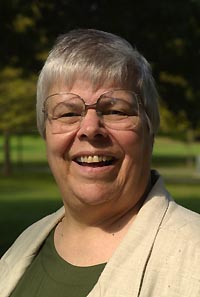|
This is an archived article.
For the latest news, go to the Advance
Homepage
For more archives, go to the Advance Archive/Search Page. |
||
|
Institute Encourages Social Workers,
Clients to Join Political Process By Claudia G. Chamberlain Politics, according to the late Adlai Stevenson, is the people's business and the most important business there is. That sentiment is the underlying philosophy behind a fledgling initiative at the School of Social Work, the Institute for the Advancement of Political Social Work Practice.
The Institute seeks to make students savvy about how political power operates in this country and how best social workers can use and tap into that power on behalf of their clients. The dual goals of politically empowering clients and gaining the election of social workers to political office are at the heart of the Institute's work. The Institute, located in the School of Social Work at the Greater Hartford campus, was founded in 1995 with modest funding from the University. Since its formation, some 50 graduate students and a handful of undergraduates have held internships at the Institute. "One of our goals is to increase the number of social workers elected to local, state, and federal offices," says Nancy A. Humphreys, a professor of social work who launched the Institute and serves as its director. "So much of the agenda of legislators is about social service issues, yet very few of the people making decisions have direct experience," says Humphreys. "As an enterprise, we've been under-repres ented. Humphreys says the Institute fosters social workers' ability to help their clients become politically powerful and to learn to vote for their own political interests. "The tricky part," she says, "is that we have to do all of this in a non-partisan way." Since its inception, the Institute has been run by three to five interns each semester whose activities include publishing a newsletter and other publications on topical social work and politically-related issues. The Institute's curriculum includes independent study and courses covering the history of politics, political theory, and ways in which politics and government operate. One of the hands-on roles of interns is directed at politically empowering their clients through voter registration. The interns help clients register to vote, encourage them to vote, and make sure they know when and where to vote and how to use the voting machine. The project also involves helping clients learn about issues so they can make informed decisions. The Institute holds a weekend-long campaign school each May, conducted by social workers who themselves are political figures from throughout the United States. To date, some 200 social workers, social service employees, and UConn students have participated in the campaign school. Instructors have included politicians such as C. Virginia Fields, Manhattan Borough President, who holds a master of social work degree; Ruth Messinger, a social worker who ran for Mayor of New York City; and Kate Coyne-McCoy, the Eastern Regional Director of Emily's List, a pro-choice Democratic women's political action committee and the second largest in terms of money raised to fund the election campaigns of women to state and federal officers. "The campaign school gets students thinking about political issues and how they can get involved in political campaigns," says Humphreys. "It also gets them thinking about their own future as campaign leaders or running for office." Gretchen Vivier, who graduated from UConn in May with an MSW, is a strong proponent of the Institute. "I've become fascinated by the political process," says Vivier. "I realized that if we want to truly advocate for social change, we're going to have to get involved in the political system." Vivier, the newly appointed director of Health Care for All Coalition, a non-profit agency under the umbrella of the Connecticut Citizens Action Group, has been politically active as a staff member of the National Association of Social Workers' Political Action for Candidate Election (PACE). She has been involved in PACE activities in Connecticut, including the endorsements of 15 candidates in the November elections. Her responsibilities include organizing, communications, recruiting, and targeting campaign volunteers. "The Institute helped to develop a passion in me and gave me skills for how to become involved and use my voice to advocate support on behalf of clients," says Vivier. Although she doesn't expect to run for public office herself, she has become immersed in the political process. "The process is very important and really is part of the job as a social worker," she says. "Our code of ethics requires that we advocate on behalf of our clients." According to Humphreys, four members of Congress, two women and two men - three of whom are persons of color - and two U.S. senators, both women, hold professional social work credentials. The most senior of them is U.S. Senator Barbara Mikulski, Democrat, of Maryland, the longest-serving woman elected in her own right. Humphreys would like to see the number of social workers in Congress double. She says some participants in the Institute's campaign school have returned to their respective states to run for political office, including two UConn MSW graduates who ran - unsuccessfully - for Congressional seats in Pennsylvania and Rhode Island. Others from the campaign school have run for state office. "We are currently doing a follow-up on all of the participants who attended the campaign school," Humphreys adds. She is quietly optimistic that the results will reflect some elective office holders. Humphreys is on sabbatical this semester working on a book about the School of Social Work's experience in Armenia. She is also writing an article about a project of the Institute to help the staff and clients of a non-profit community-based mental health center in Western Massachusetts become more politically active. |

